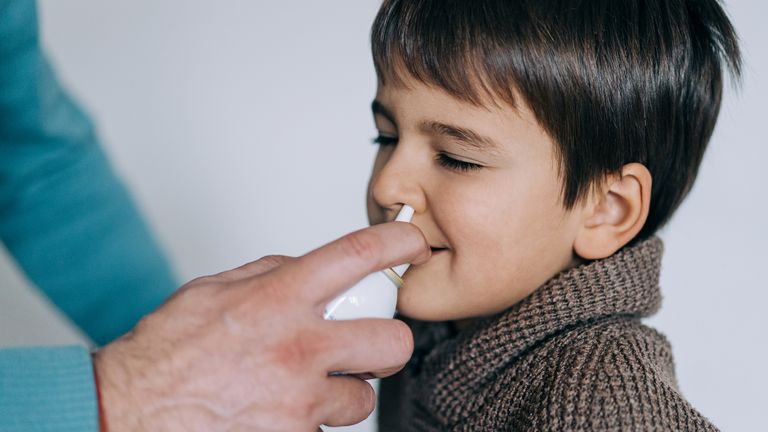Giving children a solution made up of salt and water can cut the duration of a cold by two days, researchers have suggested.
A study found that cold symptoms lasted for an average of six days after using salt water nasal drops – also known as saline solution – compared to eight days after using typical cold medicine.
It could also cut the chance of passing colds on to other family members.
Professor Steve Cunningham, from the University of Edinburgh who worked on the ELVIS-Kids randomised controlled trial, said: “Children have up to 10 to 12 upper respiratory tract infections – what we refer to as colds – per year, which have a big impact on them and their families.
“There are medicines to improve symptoms, such as paracetamol and ibuprofen, but no treatments that can make a cold get better quicker.
“We found that children using salt water nose drops had cold symptoms for an average of six days when those with usual care had symptoms for eight days.
“The children receiving salt water nose drops also needed fewer medicines during their illness.
“Reducing the duration of colds in children means that fewer people in their house also get a cold, with clear implications for how quickly a household feels better and can return to their usual activities like school and work.”
He said the 2.6% salt water concentration cannot currently be bought over-the-counter and needs to be made up by parents, which his team will help with by releasing “simple instructions” and a video within the next few days.
Explaining how salt may work to cut the length of colds, Prof Cunningham said: “Salt is made up of sodium and chloride. Chloride is used by the cells lining the nose and windpipes to produce hypochlorous acid within cells, which they use to defend against virus infection.
“By giving extra chloride to the lining cells, this helps the cells produce more hypochlorous acid, which helps suppress viral replication, reducing the length of the virus infection, and therefore the duration of symptoms.”
407 children aged up to six took part in the study, which was presented at the European Respiratory Society Congress in Vienna.
Some 301 children developed a cold and the parents of 150 of these were given sea salt and taught to make and apply salt water nose drops to the children’s noses (three drops per nostril, a minimum of four times per day, until well).
The other 151 children had usual care.
In children given the drops, fewer households (46%) reported family members catching a cold versus the typical methods (61%).
Some 82% of parents said the nose drops helped their child get better quickly while 81% said they would use nose drops in the future.
Dr Matthew Siggins, research fellow at the National Heart and Lung Institute at Imperial College London, who was not involved in the study, said the research showed a degree of success with reducing the length of symptoms, “albeit only moderately”.
He said results of the trial matched a larger study in adults conducted at Southampton University, which also showed the application of simple saline water reduced symptoms by around two days on average.
He called for future studies to help design sprays that can more effectively suppress symptoms and spread.









